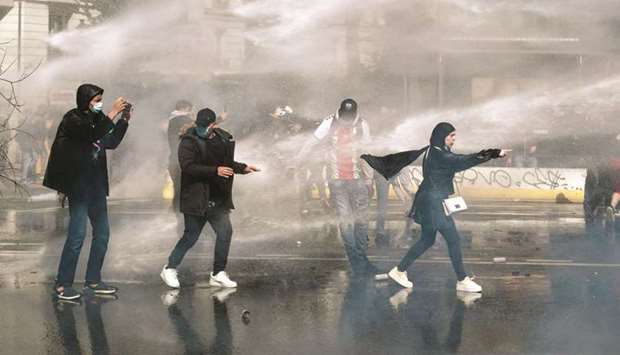Paris police used tear gas and water cannon yesterday to disperse a pro-Palestinian rally held despite a ban by authorities, who feared a flare-up of anti-Semitic violence during the worst fighting between Israel and Hamas in years.
The interior ministry said between 2,500 and 3,500 people converged on the heavily immigrant Barbes neighbourhood in the north of the capital, while organisers claimed as many as 5,000 rallied amid a massive security presence involving some 4,200 officers.
Police blocked off wide boulevards as well as narrow streets where some of the protesters were forced to retreat, while knots of residents and passers-by watched or recorded the scene with their phones.
Some threw stones or tried to set up roadblocks with construction barriers, but for the most part police pursued groups across the district while preventing any march toward the Place de la Bastille as planned.
“You want to prohibit me from showing solidarity with my people, even as my village is being bombed?” said Mohamed, 23 and wearing a “Free Palestine” T-shirt.
Other demonstrators chanted “Free Palestine” or “Israel, get out, Palestine doesn’t belong to you” while waving the territory’s flag.
As a cold rainstorm settled over the city toward evening, many protesters left, leaving a large group of mostly young men facing off against ranks of officers who held their ground on a stretch of boulevard.
A handful of garbage bins were set on fire and rocks and other projectiles were hurled toward police, who broke up the demo by around 7:00pm (1700 GMT).
Out of 51 arrests at protests nationwide, 44 people were held in Paris. One policeman was slightly hurt in the capital and another in Nice.
The march was banned Thursday over concerns of a repeat of fierce clashes that erupted at a similar Paris march during the last war in 2014, when protesters took aim at synagogues and other Israeli and Jewish targets.
But Walid Atallah, president of the Association of Palestinians in Ile-de-France, the region encompassing Paris, accused the government of inflaming tensions with the ban.
“If there were genuine risks of public disorder, of serious problems, they would have prohibited it right away,” he told a press conference ahead of the march.
“They banned it at the last minute —it’s unacceptable,” he said. Similar protests in Germany and Denmark this week have degenerated into clashes leading to several arrests.
The protest had originally been called to mark the Nakba, as Palestinians call the “catastrophe” of Israel’s creation in 1948, which turned hundreds of thousands into refugees. But a Paris court upheld the ban Friday, saying the “international and domestic context” justified fears of unrest “that could be as serious or even worse than in 2014”.
Interior Minister Gerard Darmanin also called for similar bans in other cities if necessary, and officials prohibited marches in Nice, where around 150 people gathered nonetheless, and in some Paris suburbs.
“We don’t want scenes of violence, we don’t want to import a conflict onto French soil, we don’t want eruptions of hate on our streets,” government spokesman Gabriel Attal said yesterday in Marseille.
But no incidents were reported as around 22,000 people nationwide gathered for 60 protests and marches around France, according to interior ministry figures. Demonstrations took place in Strasbourg, Marseille, Lyon and Nantes, among other cities.
Critics accuse France of being too favourable towards Israel in the latest conflict, which has seen a barrage of rocket fire from Gaza met with Israeli artillery and air strikes. The ban has caused a split among French politicians, with President Emmanuel Macron’s centre-right party and the right-wing opposition supporting the move, but leftists calling it an unacceptable attack on freedom of expression.
Macron’s office said he spoke with Israeli Prime Minister Benjamin Netanyahu on Friday, offering his “condolences for the victims of the rocket fire claimed by Hamas and other groups.”
The statement said Macron urged a return to peace and “his concern about the civilian
population in Gaza”.

Protesters stand in front of a water cannon during a demonstration in solidarity with the Palestinians called over the ongoing conflict with Israel in Paris, yesterday. Right: Protesters hold signs as they take part in a demonstration in support of the Palestinian cause in Paris.
